"The only thing that's fake is the outcome."
I visit the set of "Wrestlers", Netflix's next big sports show
I’ve never considered myself a fan of professional wrestling.
Sure, I have some background with it. Wrestling was practically in the drinking water as I was growing up in the 1980s—then-WWF stars like Hulk Hogan, Andre the Giant, Macho Man Randy Savage and The Ultimate Warrior were every third-grader’s mythological figures, the heroes whose moves we emulated on the playground and the images that adorned the most-desired items on the ice cream truck.
Unlike many men in my extremely-online Elder Millennial cohort, though, I didn’t keep up with wrestling as a teenager or an adult.
Sitting across from Al Snow, I got the sense that I might be missing out on something.
I spent this past Saturday at Davis Arena, the home venue of Louisville-based Ohio Valley Wrestling (OVW), one of the last true old-school indie wrestling companies remaining. I was there for a press event promoting Wrestlers, a new seven-part documentary miniseries that debuts today on Netflix. I’d been invited on the merits of the streaming sports television coverage I do for Decider, but I’d been initially hesitant to attend, given my lack of familiarity with present-day professional wrestling. Ultimately, though, I realized that I couldn’t pass up a chance to peek into an unfamiliar world only a fifteen-minute drive from my Louisville home.
“There’s a difference between performing wrestling, and what we call working wrestling,” Snow—a former WWE star himself and the current CEO of Ohio Valley Wrestling—explains to me as we sit in his office, a small, cluttered space whose walls are lined with posters, trophies and belts from his days in the ring.
“Working—the term work—is to make someone believe a lie, to con them. That’s a work. The only lie about wrestling, period—the only thing that’s fake about wrestling, the only thing that’s ever been fake and the only thing that’ll ever be fake, is the outcome. Everything else you see in wrestling is 100% real.”
“Even the personas and personalities are, to some degree, who they really are—just with the volume turned way up. Vince McMahon is really Vince McMahon, just over-the-top on TV. Steve Austin is really Steve Austin. If they weren’t really who they are, the audience can smell it, and it doesn’t sell. You have to be authentic. It’s very similar to stand-up comedy; a stand-up comic has to go up there and be authentic and real, or you don’t buy them.”
That push to show authenticity is central to Wrestlers, a show that I watched preview screeners of in advance of the press event, and genuinely enjoyed. It’s a sharp, well-crafted show, made by the same team as previous Netflix sports hits like Cheer and Last Chance U.
Much as promoters like Snow work to craft conflict between the good guys—the babyfaces, in wrestling parlance, and the bad guys, or heels—the people behind Wrestlers had to set up a conflict.
Matt Jones and Craig Greenberg are their heels.
The two men—the former widely known locally for Kentucky Sports Radio, his University of Kentucky-focused media company, and the latter the current mayor of Louisville—purchased a controlling stake in OVW from Snow in 2021, and they spend much of Wrestlers’ seven episodes hectoring Snow and his wrestlers and staff to find ways to make more money for the unprofitable business.
Neither man is stranger to controversy—Jones often courts it through his radio show, and Greenberg just went through a bruising mayoral campaign—but they found themselves surprised by the often-strong opposition they encountered from the wrestlers and staff at OVW, who were understandably wary of the two outsiders.
“There’s a part of me going… why can’t these people understand I’m trying so hard, but I just don’t have their respect, or their trust?”, Jones recalls to me. “I’m not surprised if I’m the heel,” he says later, “because in real life, at times, I’m sure they saw me as the heel.”
In contrast to the other media members present for the event, I’m the only local—a coincidence Netflix’s press team hadn’t realized when they invited me to attend. I asked Jones to talk about what the show—and the success or failure of Ohio Valley Wrestling—could mean to the place we both call home.
“I wouldn’t have done this if it wasn’t in part about Kentucky, and about trying to keep this thing in Kentucky,” Jones says. “Professional wrestling in Louisville goes back to the ‘60s and ‘70s, if not before. It was part of Jerry Lawler’s territory—Andy Kaufman wrestled here against Jerry Lawler in the Louisville Gardens. This was considered one of the great pro wrestling towns, and when we heard that this thing was about to go away… I wanted this for Louisville, for the state of Kentucky.”
I noted that, before watching the show, I’d had reservations that Kentucky might be shown in a negative light by out-of-town filmmakers, a fear that I was relieved to find unfounded.
“I knew if it didn’t portray Kentucky well,” Jones laughs, “I’d be the person that Kentucky would blame—like, you brought in these outsiders to mock us?”
Wrestlers is, thankfully, free of mockery for its subjects, people who—in contrast to their swaggering, over-the-top ring personas—mostly come off as genuine, relatable, downright likeable people, an impression I was able to confirm firsthand as I sat down with a half-dozen of them for interviews prior to a live Saturday night taping of their long-running wrestling show.
Mahabali Shera—real name Amanpreet Singh Randhawa—is someone you can’t help but root for. A massive, muscular figure in the ring, he’s so polite and soft-spoken in person that I worried his answers might not be picked up by my iPhone’s voice recorder as we sat ringside for an interview. He spoke with enthusiasm and gratitude for the people who’d helped him get where he is today—going from a small city with few opportunities in Punjab, India first to Mumbai and later the United States, where he dreams of using future stardom to pay their kindness forward.
“I’ve been praying everyday,” he tells me. “I think it’s going to be huge. The more I get bigger, the more I want to help people. I know if there’s a guy in a small town, dying to do something, but there’s no opportunity, I will pay and support him. Show me what you can do.”
Similar positive energy radiates off Mike Walden, who wrestles under the name Ca$h Flo. At 47, he’s the oldest of the active wrestlers portrayed in the show, but he’s also one of OVW’s top draws, and he’s thrilled for the possibilities Netflix offers.
“I truly believe there is nothing out there like this,” Walden tells me. “They’ve had complete access to us, our lives, our families… it’s all exciting. I’m super stoked for the world to see what we go through on the daily. It’s all about positivity.”
Walden’s family life is among the most endearing storylines in the show—he’s often seen at home with his wife and teenage children; a regular, affable dad, albeit one known for in delivering blistering hand-chops to the chests of opponents.
“I know it’s going to be good,” Walden continues, “because it’s really who we are, it’s how we choose to live our lives. I hope people look at it, they clap their hands, they cheer, they cry… it’s our lives.”
While a few of the figures in Wrestlers—Snow, Jones, Greenberg, and former Big Brother contestant-turned-wrestler Jessie “Mr. PEC-tacular” Godderz—had experience in front of cameras, for others—like young Haley “HollyHood Haley J” James, the wrestler who gets the most screentime in the documentary—it was an adjustment.
“Greg [director Greg Whiteley] is awesome,” Haley told me, her mother—fellow wrestler and frequent opponent Maria James—by her side. “I feel like I had some attitude moments, because I'm not used to people being up my butt 24/7, but he handled me well. He really did. It was a good experience overall, but emotionally, it brought a lot out. It was overwhelming, but during the process, them showing me clips, it was like… it’s gonna be worth it.”
My battery of interviews wrapped, and we adjourned for a dinner break before the show. I wasn’t sure what to expect of it; I’d only been to one wrestling event in my life, a WWF house show in at the now-long-since-demolished Richfield Coliseum near Cleveland that my father took my brother and I to in 1990 or so.
I was curious to see how this compared to those now-mostly-fuzzy memories.
For a portion of the show, I was permitted into OVW’s control room, where I could watch Snow and his team conduct the proceedings like an orchestra, relaying instructions to speed up or slow down a match to the wrestlers via a discreetly-mic’d up referee. When one wrestler came down hard—and the people in the control room winced—I could tell a move hadn’t gone as intended. They quickly performed a wellness check through the referee and confirmed he was okay, with the crowd outside none the wiser to the ongoing discussion.
I exited the cramped control room and returned to my seat among the few hundred fans who’d paid $10 apiece for three hours of live entertainment. (For a time, I was seated next to Greenberg and his wife, and chuckled to myself about the series of events that had led me to watching an indie wrestling show next to the mayor.)
The crowd was stocked with regular attendees who knew each wrestler, each storyline, each long-simmering drama, and wore t-shirts and waved signs reflecting that knowledge, and they roared with approval or disdain at each move. When each blow connected, when each body hit the floor, it sure didn’t sound fake, even if it was planned in advance.
I thought about how quickly I’d warmed to the idea of professional wrestling, and wondered if I was an easy mark, considering that I’d been invited as a critic. Going back to my childhood—even as far back as that event I’d attended as an eight-year-old—I’d always had a slight bafflement over how fans could get so worked up over a sports whose outcomes were preordained.
I thought about what Snow had told me earlier that day:
The only thing that’s fake is the outcome.
As the final match took place—a moderately-famous guest wrestler facing off against Shera and Ca$h Flo—I didn’t know the outcome yet. What I did know was how hard these people were working to put on a good show, to tell a good story, to give their devoted fans a fun night of entertainment and chase a dream that few get to live out.
I found myself cheering for them, and hoping that Wrestlers gives them the kind of boost they’re hoping for.
For her part, Haley J is confident it’s going to work.
“It’s gonna be a hit. I thought I was a superstar anyways, so it’s nothing new to me. I’ve been saying it my whole life.”
“Now y’all know.”
—Scott Hines (@actioncookbook)
ACBN News & Notes:
On Monday, I sent out a reminder that tomorrow—Thursday, September 14th—is Give For Good Louisville, a major local charitable giving event in which I’m supporting Personal Counseling Services, a mental health nonprofit that I sit on the Board of Directors for. I’ll be sending out more reminders throughout the day tomorrow, and I’d truly appreciate if you can support this worthy cause!
The winner of last week’s Where In the #@&% is Glen From Cincinnnati guessing game was Kevin B., who was the first of many to suss out that our roving food criminal was at Camp Washington Chili in his hometown of Cincinnati, Ohio. I’ll drop Glen’s next set of clues in Friday’s newsletter—we’re nearing the end of our chase!



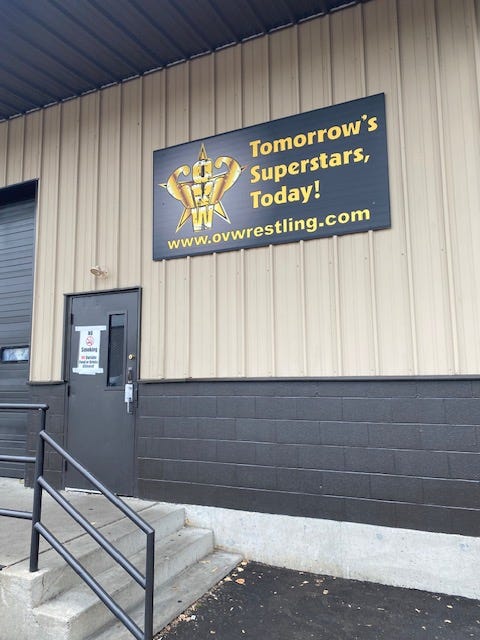
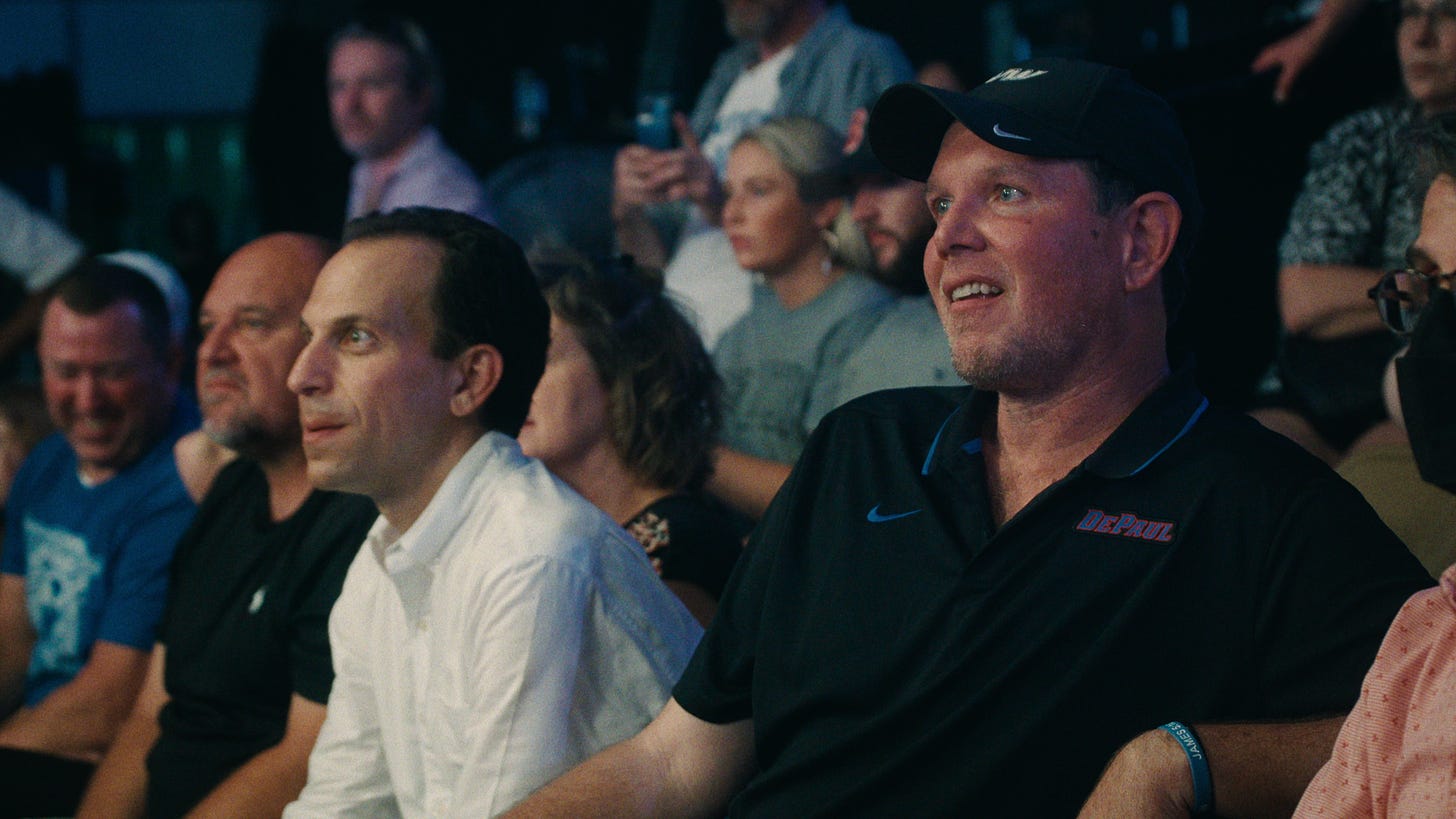
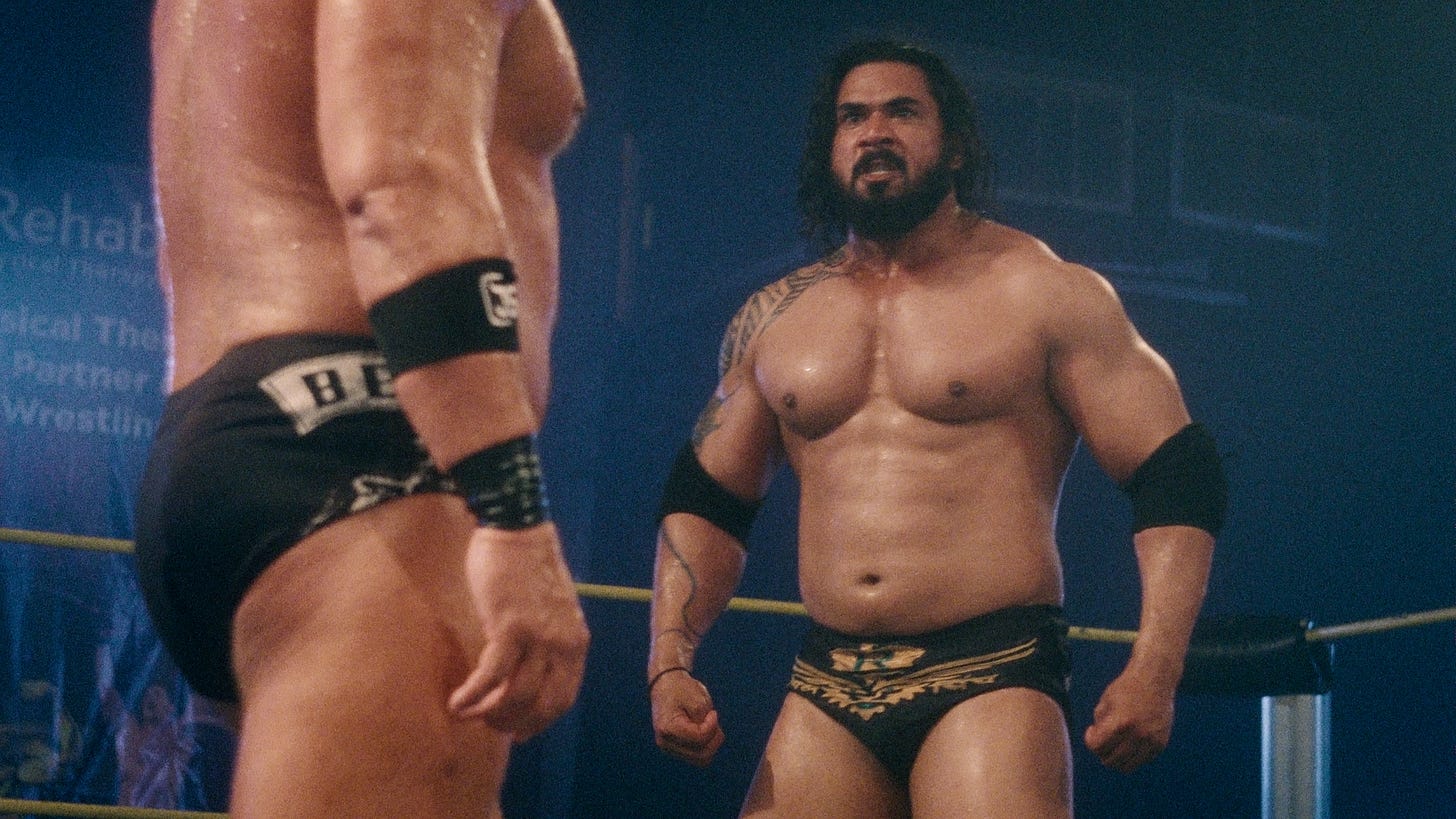
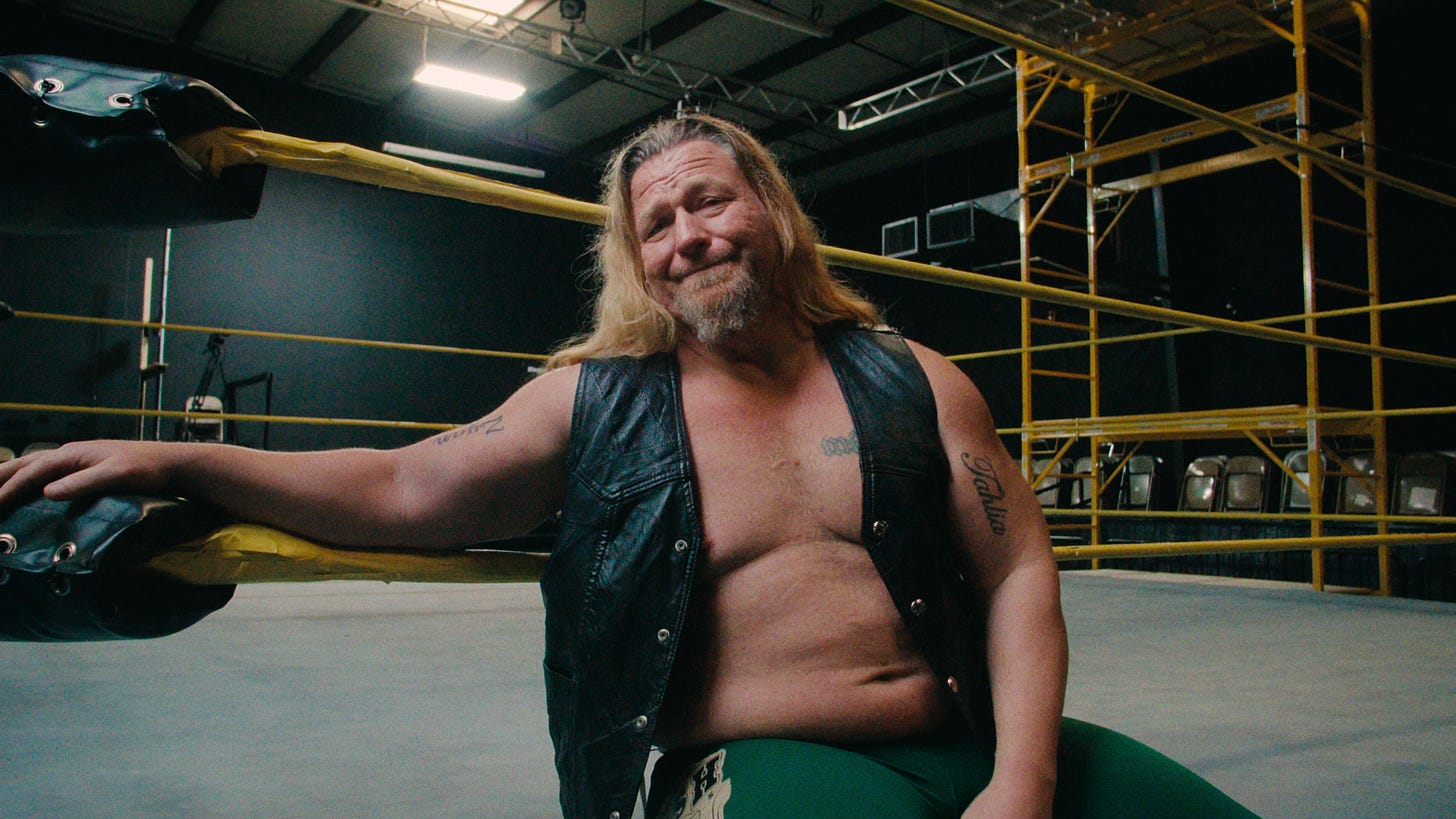
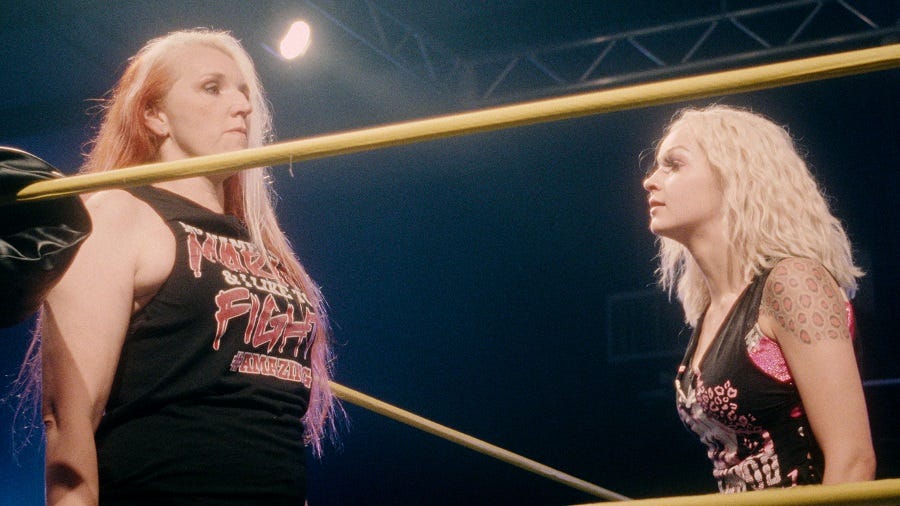
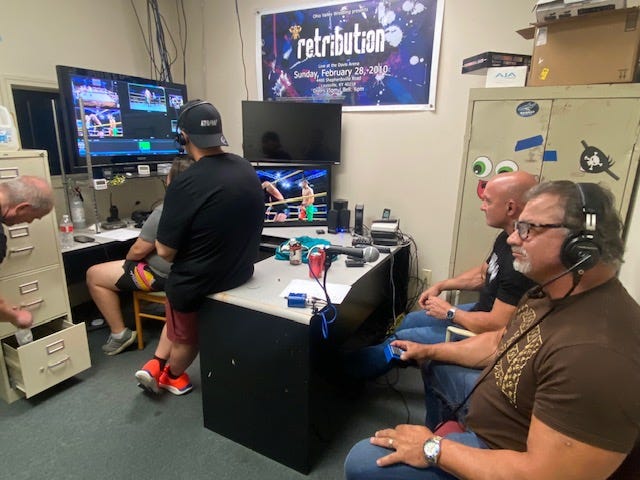
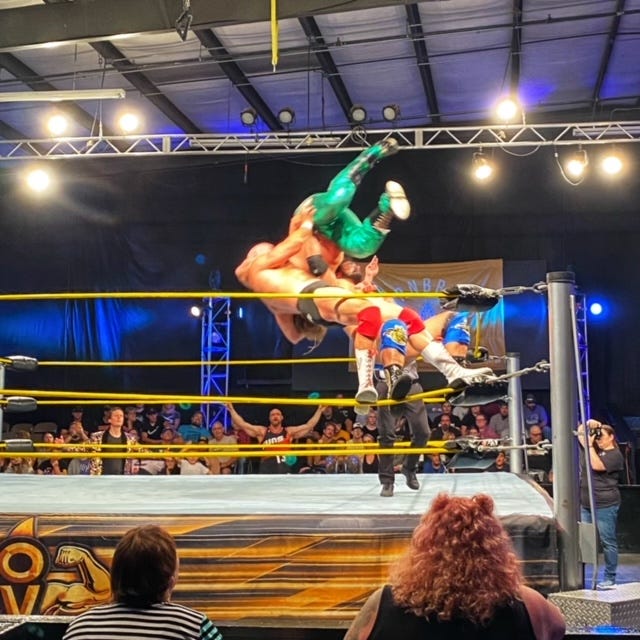
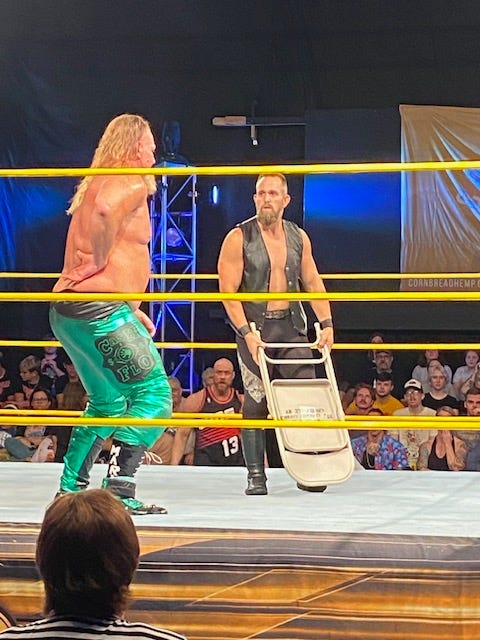
The feature piece that I wrote for Decider about Netflix's "Wrestlers" is now live:
https://decider.com/2023/09/13/wrestlers-netflix-decider-interviews/
I went to an indie wrestling show in Houston and it was the most fun. It was horror themed and an all woman show for mother's Day. The finale wound up being an undead doll character named doll face who was fighting against her ghost twin for possession of the doll's body and wound up instead taking control of the producers body. I cannot recommend to everybody reading this to please go and see a local wrestling show for an incredibly good time. Glad you loved it Scott!